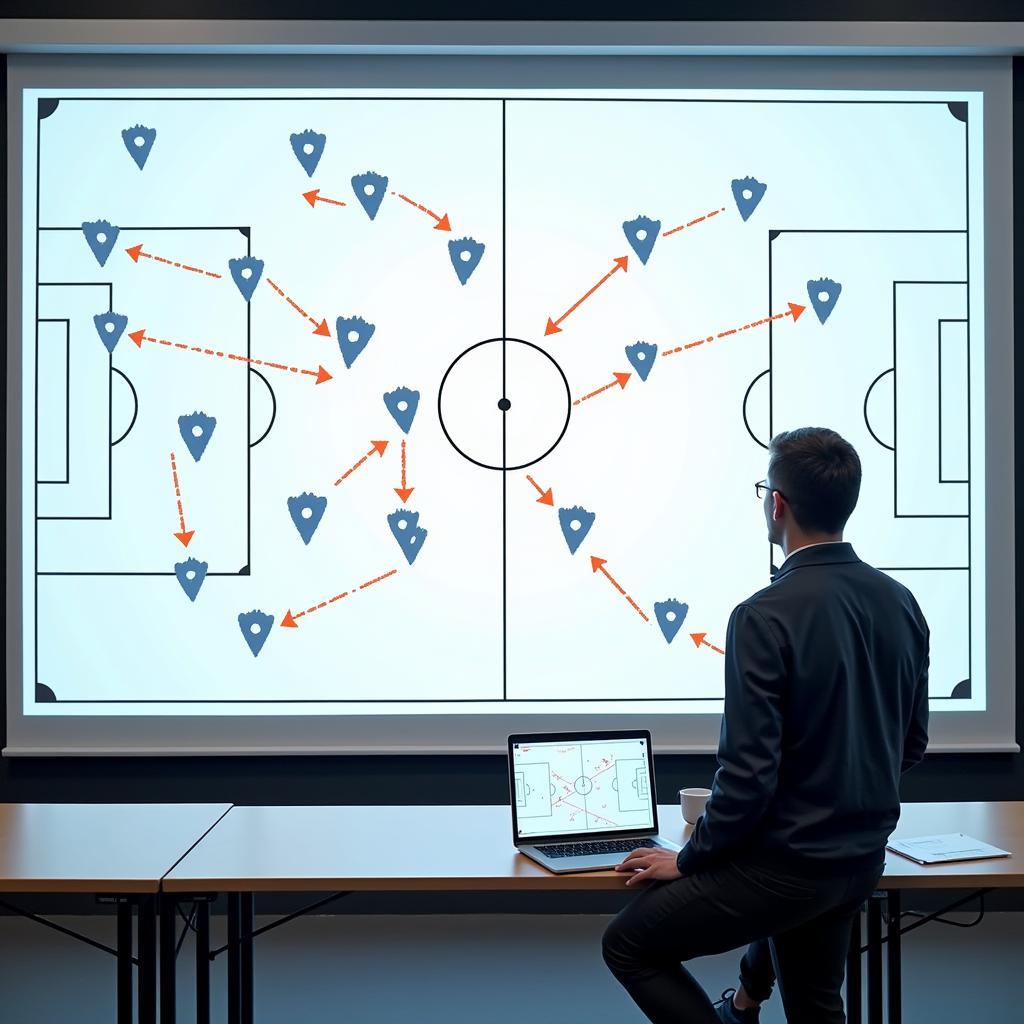Understanding the beautiful game of football goes beyond just watching the players run and kick the ball. To truly appreciate the tactical nuances and strategic brilliance, you need to analyze the match with a keen eye for detail. This comprehensive guide will equip you with the tools and knowledge to dissect a football match like a pro, allowing you to predict outcomes, appreciate individual skill, and engage in meaningful conversations about the sport.
 Tactical analysis of a football match
Tactical analysis of a football match
Pre-Match Preparation: Laying the Groundwork
Before the whistle blows, it’s crucial to gather as much information as possible to contextualize the upcoming clash. Researching both teams’ recent form, head-to-head statistics, and playing styles will give you valuable insights into their strengths, weaknesses, and potential game plan. For instance, a team known for its possession-based football might struggle against a high-pressing opponent.
Analyzing Team Form and Statistics:
- Recent results: Look at their last 5-10 matches to assess their winning streak, losses, or draws. This gives an indication of their current form and morale.
- Goals scored and conceded: Analyzing their attacking and defensive records reveals their efficiency in front of goal and vulnerability at the back.
- Key player performance: Identify players in good form or struggling, as their individual performances can significantly impact the team’s overall display.
Understanding Tactical Approaches:
- Formation and playing style: Familiarize yourself with their preferred formation (e.g., 4-3-3, 4-4-2) and playing philosophy (e.g., possession-based, counter-attacking).
- Strengths and weaknesses: Identify areas where each team excels or struggles. For example, a team with pacy wingers might favor attacking on the flanks.
- Head-to-head record: Previous encounters between the teams can provide valuable insights into their psychological edge and potential tactical approaches.
In-Match Observation: The Real-Time Assessment
While the pre-match analysis sets the stage, the actual match is where your analytical skills come to the forefront. Watching the game with a critical eye for tactical battles, individual brilliance, and game-changing moments will allow you to understand the ebb and flow of the match.
Tactical Battles and Formations:
- Midfield battleground: Observe how teams control the midfield, the area where most of the game’s tempo and possession changes occur.
- Attacking patterns: Analyze how teams build their attacks, whether through the flanks, central areas, or long balls. Look for patterns in their movement and passing.
- Defensive organization: Pay attention to the team’s defensive shape, pressing triggers, and how effectively they close down space.
Individual Player Performances:
- Technical skills and decision-making: Evaluate players based on their passing accuracy, dribbling skills, shooting ability, and tactical awareness.
- Work rate and contribution: Consider their off-the-ball movement, defensive contributions, and overall impact on the game, even if they are not directly involved in goals.
- Impactful substitutions: Analyze how substitutions influence the game’s dynamics, especially in terms of tactical shifts and fresh legs.
Game-Changing Moments and Momentum Shifts:
- Set-pieces: Pay attention to corners, free kicks, and penalties as they often lead to scoring opportunities and momentum swings.
- Individual brilliance: Moments of magic from individual players, like a stunning goal or a crucial interception, can completely change the game’s complexion.
- Managerial decisions: Analyze substitutions, tactical changes, and player motivation as they often directly impact the game’s flow and outcome.
 Post-match football discussion among fans
Post-match football discussion among fans
Post-Match Reflection: Drawing Conclusions
Once the final whistle blows, the analysis doesn’t end there. Reflecting on the match, identifying key takeaways, and understanding the reasons behind the result will further enhance your analytical abilities.
Evaluating the Result and Performance:
- Justifying the outcome: Analyze the factors that contributed to the win, loss, or draw, considering both team and individual performances.
- Identifying key moments: Pinpoint specific moments that proved decisive in shaping the final result, such as a missed penalty or a late goal.
- Statistical analysis: Review match statistics like possession, shots on target, and pass completion rates to gain a quantifiable understanding of the game.
Learning and Applying Insights:
- Recognizing patterns: By analyzing multiple matches, you can start to identify recurring patterns in teams’ and players’ performances.
- Predicting future outcomes: Your analytical skills will gradually enable you to make more informed predictions about future matches and player performances.
- Enhancing your appreciation: Deeper analysis fosters a greater appreciation for the strategic intricacies and tactical nuances that make football such a captivating sport.
By consistently applying these analytical approaches, you’ll be well on your way to dissecting football matches like a seasoned professional. Remember, analysis is a continuous learning process that involves observation, reflection, and a passion for the beautiful game.


